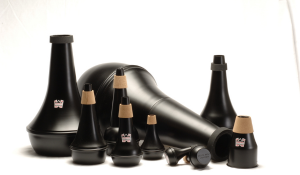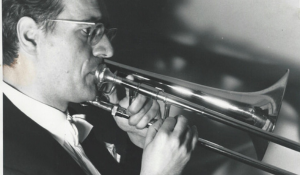
As every teacher knows, a good tone on any brass instrument needs a properly set-up embouchure; these days one may assume that the young player will have a reasonable instrument and a sensible mouthpiece. To this one could add what many teachers would regard as the most important of all – good breath control.
One aspect of the brass-blowing body-machine which is hardly ever emphasized enough is the throat. By opening the throat area, or closing it, the tone-quality can be varied enormously. Although the differences are not quite as much as in singing, they can easily be heard, on any brass instrument. It remains a problem, however, to put across to the young player the concept of “open your throat!” Many ideas like “swallowing a football”, “yawning outwards” or “cooling a hot potato” can work to a greater or (usually) lesser degree, but the use of a Denis Wick practice mute can very easily solve the tight throat problem and also dramatically improve breath-control.
The difficulty that youngsters have with breathing well, often stems from the fact that they are hardly ever allowed to play a maximum ff, and for good reason, nobody practices loudly! Trying to breathe well through a tight throat is fairly impossible anyway, so what one often hears is poor breath support and a rather choked sound.
Try the following:
1) The “Before” Test
(Remember exactly how this sounds) Play mp the first 5 notes of the scale of F (In treble clef the scale of G (second line)) just mp, remember!
2) Play, with the practice mute inserted, low Bb (C) loudly.
Take a deep breath, holding shoulders down, play louder. The note becomes less controlled with increasing volume. Try again, much louder. You will notice, as the volume increases, a “buzz” or rattle from the end of the mute. This “buzz” wobbles and fluctuates. Keep trying to play even louder, make sure that the “wobbles” become more level. Breathe as deeply as possible. Push the air through in a controlled way. Keep increasing the volume. If you begin to feel slightly dizzy, that is quite normal (Hyperoxygenation). Now, with the same or more volume, play a semitone lower gradually progressively descending a semitone at a time, until you are playing the loudest low E (F#) you have ever heard, continuing to breath as deeply as possible. I always describe this as the brass-player’s equivalent of weight lifting.

